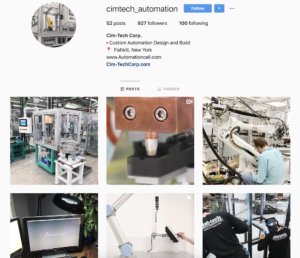More manufacturing companies are adopting modern marketing trends in order to stay ahead of the competition. Savvy business leaders are leveraging technology such as automation and social media to convert new customers, and maintain relationships with current customers. We’re sharing a few of the top trends to expect in manufacturing marketing going forward.
Content Marketing
82% of manufacturing companies are engaging in some form of content marketing, proving the phrase “content is king.” As content marketing becomes increasingly mainstream in the manufacturing industry, greater emphasis is being put on creating high quality content for potential and existing customers. Content marketing helps attract potential customers looking to find out more about you. It also establishes your content as a credible and easily accessible representation of your company. Considering that over half (57%) of B2B buyers make their purchase decisions before ever actually talking to a representative from a company–content marketing helps companies put their best foot forward. White papers, blogs, e-books, and email newsletters are all viable options for better assisting consumers in finding product, company and industry information on their own time.
Video Marketing
As technology improves, video is quickly becoming a leading component in manufacturing marketing and will likely continue as such moving forward. Video is a highly effective platform for manufacturing marketers to engage target audiences and tend to B2B customer’s desire for more simplicity in accessing the right information without the help of a sales rep. Product demonstrations, instructional videos and company overviews are all perfect examples of ways video can be used for in manufacturing marketing. Should a topic be particularly complex, video is a preferred option considering that viewers retain up to 95% of what they watch in a video. Additionally, thanks to camera technology advancement, creating quality video content no longer requires a costly production team or professional equipment. Depending on the focus of your video marketing campaign there are various types of video formats suitable for manufacturing companies. A few suggested video types include:
- Video blog – Write out a few of the most common questions you get from your customers and create one video per question. Film five to 10 questions at a time, and schedule one video blog (Vlog) to be posted per week. Marketing guru Neil Patel’s YouTube channel is a great example of this strategy. By converting his blog articles into videos, he doubles engagement without having to create new topic ideas.
- Brand voice video – Showcase your brand with a video touring your office space, employee sound bites, and a few explainers on what makes you an industry leader.
- How-to video – Explain complex processes or technical concepts that customers often have difficulty understanding. Step-by-step product demos, preventative maintenance walk-throughs, or troubleshooting instructions are a few options.
- Social media sharing – Facebook, Instagram and Snapchat stories allow you to share spontaneous, or pre-planned scenes from your day with a broader audience.
Social Media Marketing
Social media provides marketers with a unique opportunity to connect with large audiences in an authentic and engaging way. Facebook, Instagram, Snapchat, and LinkedIn all offer their own benefits to manufacturing companies looking to connect with current and potential customers.
- Facebook Messenger is ideal for keeping up with potential customers questions and inquiries. Leveraging any form of social media communication is great for improving customer service and experiences.
- Facebook now offers the ability to change your company profile’s cover photo to a video. As the most prominent section of your profile, marketers can optimize these cover videos to showcase your business in a more engaging way.
Instagram provides a great outlet for marketers to demonstrate product offerings, upcoming events and inside looks. It’s recommended to maintain both a populated feed and regular Instagram story posts.
Mobile marketing
People are turning to mobile phones for product research and purchase decisions more than ever. This makes it critical for manufacturing marketers to optimize all marketing efforts for mobile. To keep potential customers on the hook, it’s important to deliver consistent, quality experiences for every visitor regardless of the platform they’re researching you on. A fully optimized mobile marketing campaign should include:
- Responsive web pages: Fast page loading is especially important to mobile users as they’re often in areas of weaker internet connections.
- Easy login: Enable customers to log into your site using social profiles. This makes it easier on visitors and helps facilitate the purchasing process.
- Offer mobile pay options: The option to pay via mobile can help avoid customers giving up halfway through their purchasing process because of the need to switch devices.
- Streamlined connections: Optimize each of your social media posts or advertisements to give viewers the option to easily click a link that directs them to your homepage or product pages. Additionally, when a query is received via email, your sales team can be pinged for a call in real-time.
Marketing automation
Marketing automation helps manufacturing marketers best serve consumers at all stages of the customer journey. Prospects are met with targeted communication and content based on defined actions taken, such as filling out a contact form or opening an email. This not only improves customer’s experiences as they are consistently met with relevant content specific to their interests and journey stage, but also saves time for marketing and sales teams in converting prospects. Additional uses of marketing automation for manufacturers include:
- Customer segmentation: Diving current and potential customers based on industry type, company size, geographic location and how they engage with your company online can help identify the most effective marketing approach.
- Customer service: Improve customer relationships with continuous relevant content and automated reminders when a product is due for maintenance or replacement.
- Campaign reports: Automated report tracking provides insight to what is or isn’t working and the ROI of marketing campaigns.
Marketing is a constantly evolving field, A/B testing is essential to devise the best marketing strategy. Don’t be afraid to pivot remembering that quality endures the test of time. Testing out each marketing approach can help your team discover what your target audience responds to and how to engage them.
Author Bio: Maddie Davis is co-founder of Enlightened Digital and a tech obsessed female from the Big Apple. She lives by building and redesigning websites, running marathons and reading anything and everything on the NYT Best Sellers list.
This post was written in collaboration with Enlightened Digital. To read our post about telehealth, click here.


